Individuals who mine Bitcoins needn’t be miners. We call them ‘miners’ because they are awarded BTC as they solve mathematical computations. The competition to unearth these reserve coins also serves a vital purpose. They validate the transactions of Bitcoin users all over the world: buyers, loans & debt settlement, exchange transactions, inter-bank transfers, etc. They are not really miners. They are more accurately engaged in transaction validation or ‘bookkeeping’.
There are numerous proposals for how to incentivize miners once all 21 million coins have been mined/awarded in May 2140. Depending upon the network load and the value of each coin, we may need to agree on an alternate incentive earlier than 2140. At the opening of the 2015 MIT Bitcoin Expo, Andreas Antonopolous proposed some validator incentive alternatives. One very novel suggestion was based on game theory and involved competition and status rather than cash payments.
I envision an alternative approach—one that also addresses the problem of miners and users having different goals. In an ideal world the locus of users should intersect more fully with the overseers…
To achieve this, I have proposed that every wallet be capable of also mining, even if the wallet is simply a smartphone app or part of a cloud account at an exchange service. To get uses participating in validating the transactions of peers, any transaction fee could be waived for anyone who completes 1 validation for each n transactions. (Say one validation for every five or ten transactions). In this manner, everyone pitches in a small amount of resources to maintain a robust network.
A small transaction fee would accrue to anyone who does not participate in ‘mining’ at all. That cost will float with supply and demand. Users can duck the fee by simply participating in the validation process, which continues to be based on either proof-of-work, proof-of-stake — or one of the more exotic proof theories that are being proposed now.
Philip Raymond co-chairs Cryptocurrency Standards Association. He produces
The Bitcoin Event, edits A Wild Duck and is a frequent contributor to Quora






